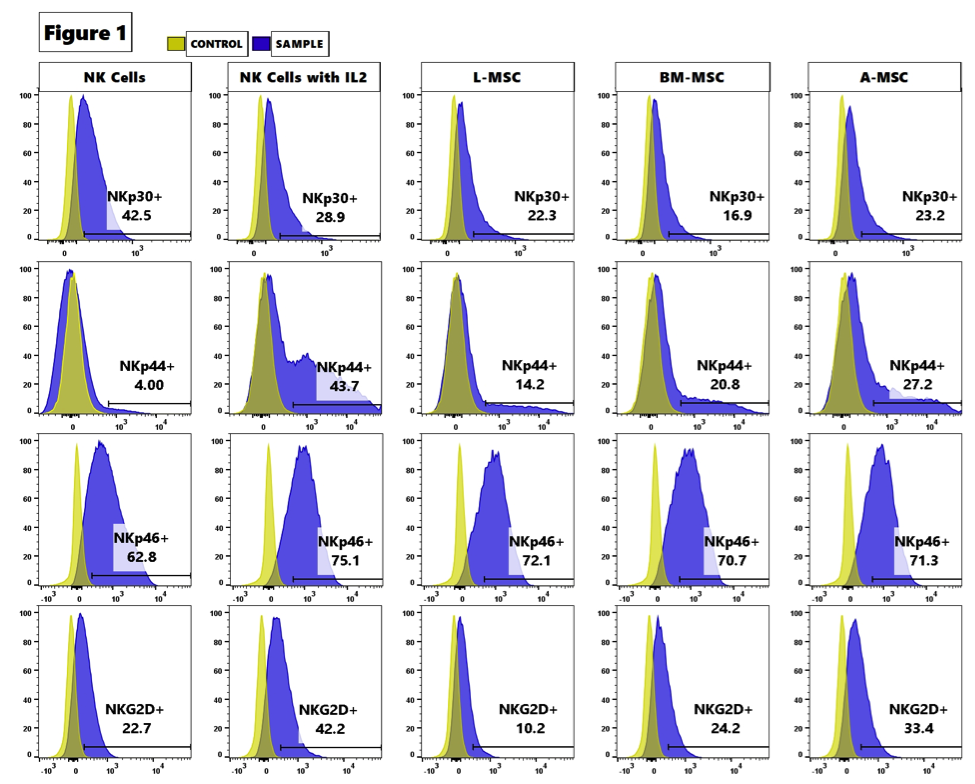Human Liver-derived Mesenchymal Stromal Cells (MSC) are Superior Inhibitors of Natural Killer Cells Compared to Bone Marrow or Adipose Tissue-derived MSC
Mayo Clinic, Rochester, MN
Meeting: 2021 American Transplant Congress
Abstract number: 539
Keywords: Immune deviation, Liver, Natural killer cells, Stem cells
Topic: Basic Science » Cellular Therapies, Tissue Engineering/Regenerative Medicine
Session Information
Session Name: Cellular Therapies, Tissue Engineering/Regenerative Medicine
Session Type: Poster Abstract
Session Date & Time: None. Available on demand.
Location: Virtual
*Purpose: Guided by the liver allografts’ unique tolerogenic microenvironment and the immunoprotective impact on simultaneously transplanted organs, we recently isolated liver mesenchymal stromal cells (L-MSC) and demonstrated that they inhibit alloreactive T cell responses better than their counterparts from bone marrow (BM-MSC) or adipose tissue (A-MSC). Here, we compared the impact of L-MSC on natural killer (NK) cell functions to those of BM-MSC and A-MSC.
*Methods: L-MSC were obtained from deceased donor allografts, while BM-MSC and A-MSC were derived from living kidney donors at the time of procurement (n=6 each). Comparative proteomic analysis was done on the secretome of each cell type. Primary NK cells were isolated from blood donor waste products using an NK cell isolation kit, stimulated with IL-2 (100U/mL), and cultured with MSC in a ratio of 10:1. Surface marker expression was assessed by Flow Cytometry, IFNɤ production by ELISA, and NK function by target cell cytolysis after 3 days of co-culture.
*Results: The PCA analysis showed that the L-MSC secretome clustered together, and was distinctly different than the A-MSC and BM-MSC secretomes. Specifically, multiple proteins involved in NK activation were reduced >2-fold (p<0.05), and those involved in NK inhibition were in upregulated >2-fold (p<0.05) in L-MSC cultures. Compared to NK cultured with BM-MSC or A-MSC, NK cultured with L-MSC had reduced surface expression of the two activation markers, Nkp44 (14.2% vs. 20.8% and 27.2%) and NkG2D (10.2% vs. 24.2% and 33.4%) (p<0.05, both) (Figure 1). Similarly, L-MSC reduced IFNγ production by NK cells by 54% (p<0.05), compared to 50% by BM-MSC and 37% by A-MSC (p<0.05). Although all three MSC reduced the cytolytic function of NK cells, the biggest reduction was observed in NK cells co-cultured with L-MSC (34% vs. 40% and 38%; p<0.05).
*Conclusions: These results suggest that L-MSC are superior to BM-MSC and A-MSC in inhibiting NK cell activation and cytolytic function in vitro. These findings provide further evidence for the immunomodulatory properties of L-MSC in their potential utilization as cellular therapeutics in the pathogenesis of autoimmune diseases and transplantation.
To cite this abstract in AMA style:
Yigitbilek F, Hansen MJ, Park WD, Stegall MD, Taner T. Human Liver-derived Mesenchymal Stromal Cells (MSC) are Superior Inhibitors of Natural Killer Cells Compared to Bone Marrow or Adipose Tissue-derived MSC [abstract]. Am J Transplant. 2021; 21 (suppl 3). https://atcmeetingabstracts.com/abstract/human-liver-derived-mesenchymal-stromal-cells-msc-are-superior-inhibitors-of-natural-killer-cells-compared-to-bone-marrow-or-adipose-tissue-derived-msc/. Accessed February 18, 2026.« Back to 2021 American Transplant Congress

